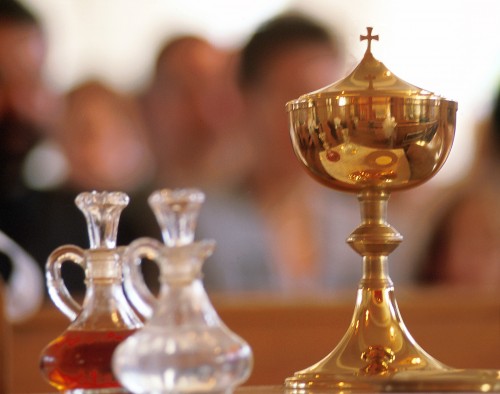I didn’t receive any questions for this month’s column, so I offer you one of my Easter time homilies:
Two weeks ago we rejoiced in the day, Easter day, that God made to celebrate the rising to glory of the beloved Son, Jesus Christ. Last Sunday, we rejoiced to take our places with Thomas the apostle and the first Christians in God’s community of Easter faith. Today, God continues to make memorial of the resurrection of Jesus Christ by giving us an Easter sacrament of his presence, the Holy Eucharist.

The Easter faith of the two travelers to Emmaus didn’t result from examining an empty tomb. It came from meeting Jesus Christ on the way, from hearing him speak to them and from his sharing a meal with them. The two disciples listened as Jesus explained how the paschal mystery, God’s Easter plan in the dying and rising of the Messiah, had been fulfilled in him. And, as they welcomed him to their table, Jesus “took bread, said the blessing, broke it and gave it to them” (Luke 23:30).
Here we find echoes of the Gospel accounts of Jesus’ miraculous feedings of the multitudes and his giving of self to the apostles at the Last Supper. Here we see what Jesus does for us, here and now, in the Eucharist.
Jesus Christ sets before us the riches of his Word and of his table, just as he has set them before believers in every time and place. What he shared with the disciples at Emmaus, he shares with us here and now: he gives us himself in his teaching and in the breaking of bread. These are the gifts we receive in every Eucharist: Christ’s Gospel for our daily living and his Body and Blood for our strengthening. This is how our faith in the risen Christ is renewed within us as we celebrate the Eucharist.
Today, we do not see the Lord Jesus in his risen body as the apostles did. But we do see him with the eyes of faith as we receive him in the Eucharist. The gift of his Body and Blood gives us strength in our weakness, comfort in our pain, joy in our sorrow. The Eucharist is God’s premier way of rescuing the suffering, healing the broken-hearted, bringing the dead to new and everlasting life.
The Eucharist is our allotted portion and cup that comes from the infinite generosity of our God. This is well expressed in the first verse of a hymn in honor of the Blessed Sacrament by St. Thomas Aquinas, a text used as the antiphon for the Canticle of the Blessed Virgin Mary on the solemnity of the Most Holy Body and Blood of Christ: “How holy this feast in which Christ is our food; his passion is recalled; grace fills our hearts; and we receive a pledge of the glory to come, alleluia.”
• a holy feast: This banquet is the gift of our all-holy God to us, a people made holy by the holy gifts we receive.
• in which Christ is our food: Every part of us is filled with the life of the risen Christ.
• his passion is recalled: Recalled so powerfully that the saving death and resurrection of Jesus become sacramentally present in the Eucharist.
• grace fills our hearts: The same grace which kindled the hearts of the two travelers on the road to Emmaus as the risen Christ spoke to them.
• and we receive a pledge of the glory to come: The glory we hope to share through the Eucharist is a share in the glory of the risen Christ.
• alleluia! This burst of praise is our response to what God gives us in the Eucharist, a response springing from our Easter faith.
Perhaps “alleluias” burst forth from the travelers to Emmaus as they raced back to Jerusalem. Perhaps “alleluias” burst forth from the apostles in the upper room as they heard their wonderful story of meeting Jesus on the road. Perhaps “alleluias” burst forth from the early Christian community as they broke bread in memory of the Lord Jesus as he has asked us to do.
Today, we join our “alleluias” to theirs, for we share with them God’s premier memorial of the resurrection of Jesus Christ: the Holy Eucharist, the sacrament of his living presence in our sacred banquet and holy feast.
Benedictine Father Michael Kwatera, a monk of St. John’s Abbey in Collegeville, serves as the abbey’s director of liturgy. Please send your questions on liturgy to him at mkwatera@csbsju.edu or at St. John’s Abbey, P.O. Box 2015, Collegeville, MN 56321-2015.






















